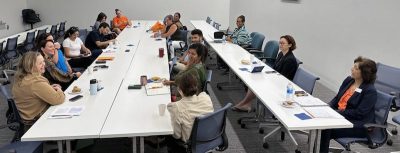First Year Seminar 101 (FYS 101) is a one-credit course required by the University for all first-year and transfer undergraduates, covering such topics as belonging, interdependence, health and wellness, identity, socialization, prejudice, discrimination, bias, and stereotype.

InclusiveU, an initiative of the Lawrence B. Taishoff Center for Inclusive Higher Education in the School of Education, offers a full four-year college experience for students with intellectual and developmental disabilities.
For the first time this fall, InclusiveU students were invited to participate in FYS 101—a significant step toward full campus inclusion.
“Students in the InclusiveU program contribute significantly to the fabric of our campus community, and they bring invaluable perspectives to the conversations that are at the heart of FYS 101,” says Marcelle Haddix, Associate Provost for Strategic Initiatives in the Office of Academic Affairs, who oversees the First Year Seminar program. “Integrating our 27 first-year InclusiveU students into FYS 101 this fall just made sense—it is the right thing to do, and every single student present in these classrooms is benefiting from their presence.”
Since FYS 101 encourages learning, conversation, and introspection on topics relevant to all incoming students at Syracuse, incorporating InclusiveU students required no modifications to the curriculum.
“This is a class about diversity, equity, inclusion and accessibility (DEIA), so it’s just another identity we were able to add to the classroom conversations,” says Shannon Hitchcock Schantz G’21, Director of FYS and a current lead instructor for the course. “Students are doing activities about their own identity and their transition to Syracuse University, and we’ve seen full participation from the InclusiveU students, sharing about their disabilities and their perspective on life.”
Brianna Shults, Director of InclusiveU, says she sought out this partnership to broaden the participation of InclusiveU students in campuswide initiatives and offerings.
“This is a class about diversity, equity, inclusion and accessibility (DEIA), so it’s just another identity we were able to add to the classroom conversations.”
Shannon Hitchcock Schantz G’21
“These are students who want the opportunity to go to college and to be fully immersed in the culture, community, and educational experience here at Syracuse,” Shults says. “We know that all students need an introduction to the University, which is why FYS exists. To include our students in things that are already being done here usually just takes a few extra steps in education and preparation, and I think the FYS 101 team has done a phenomenal job of incorporating InclusiveU students into their classrooms and fully enveloping them into the curriculum.”
The partnership officially kicked off in August, when InclusiveU staff attended training sessions for all FYS 101 lead instructors and peer leaders to provide education and build mutual understanding. “We wanted our lead instructors and peer leaders to know the InclusiveU program, understand the intentionality behind including those students in FYS 101, and learn ways to further support these students in the classroom,” says Schantz.
First-year InclusiveU student Stavros Ioannidis shared how he has appreciated the opportunity to take FYS, saying, “I like the classmates I have who tolerate different opinions, the teachers who are willing to help me (and others) out and the creativity of the teachers. They expose us to things we may not seek out on our own.”
InclusiveU students benefit not only from the curriculum but also he relationships and networks they’re able to develop with FYS classmates. “This is a class that our students take really seriously, and they’re engaged with, and it’s been great to see that level of commitment,” says Shults. “I think this only builds the network our students have available to them and increases understanding among the larger student population of why InclusiveU is here and the purpose of the program.”
Lead instructor Maithreyee Dubé ’96, ’16, G’17 has enjoyed having an InclusiveU student in her section. “Zach [Kilga] has a great sense of humor, participates in small group discussions, is great at remembering names (and helps me remember when he recognizes the need!) and submits all his work—even anything I clearly state as extra,” Dubé says.
“As the largest, most inclusive program in the country, we are continually thinking about new ways we can give our students access to things they didn’t have access to before,” Shults says. “This is just an expansion of that. We want InclusiveU students to be able to do and achieve anything they want during their time here on campus.”
This story originally appeared in SU News. Learn more about the Lawrence B. Taishoff Center for Inclusive Higher Education, part of SOE’s Center on Disability and Inclusion.
